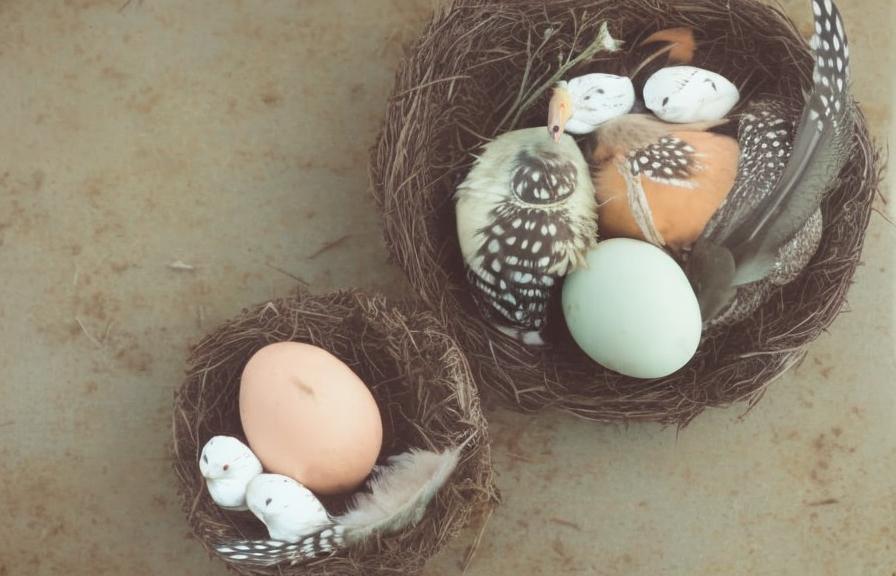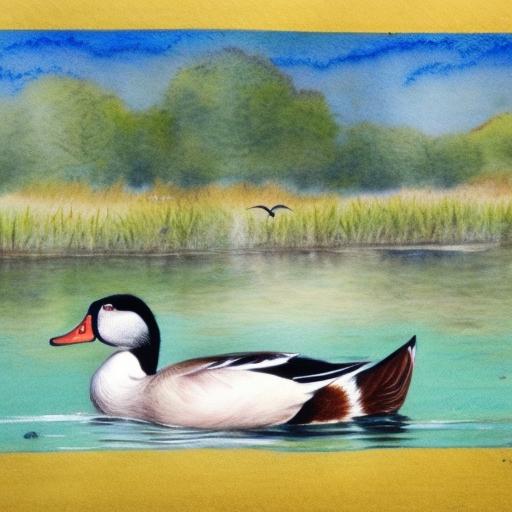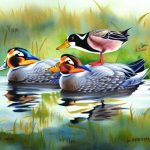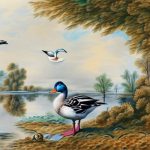Duck breeding is the process of mating ducks for the purpose of producing offspring. It is an essential aspect of duck farming, whether for meat, eggs, or as pets. Understanding the basics of duck breeding is crucial for successful reproduction and ensuring the health and well-being of the ducks. Ducks are known for their high fertility rates and relatively easy breeding process compared to other poultry, making them an attractive option for farmers and hobbyists alike.
Ducks reach sexual maturity at around 5-7 months of age, depending on the breed. They are seasonal breeders, with peak fertility occurring in the spring and early summer. It is important to note that ducks are monogamous and will form pairs during the breeding season. The male duck, known as a drake, will often display courtship behavior towards the female, such as head bobbing and vocalizations. Once a pair has formed, mating will occur, and the female will begin laying eggs. Duck eggs typically take 28 days to hatch, and the mother duck will incubate the eggs until they hatch. Understanding these basic reproductive behaviors and timelines is essential for successful duck breeding.
Duck breeding can be a rewarding experience, but it requires careful planning and management to ensure success. From selecting the right breeding stock to creating the ideal breeding environment, every aspect of duck breeding plays a crucial role in the overall process.
Key Takeaways
- Duck breeding involves understanding the basics of mating behavior, egg production, and brooding.
- Selecting the right breeding stock involves choosing healthy, productive, and genetically diverse ducks.
- Creating the ideal breeding environment includes providing adequate space, nesting areas, and proper nutrition.
- Managing duck breeding cycles involves controlling lighting, temperature, and monitoring egg production.
- Ensuring the health and well-being of breeding ducks requires regular health checks, vaccinations, and parasite control.
- Maximizing fertility and hatching success involves proper mating ratios, egg handling, and optimal incubation conditions.
- Caring for ducklings and young ducks involves providing warmth, nutrition, and protection from predators.
Selecting the Right Breeding Stock
Selecting the right breeding stock is essential for successful duck breeding. The quality of the breeding stock will directly impact the health, fertility, and overall productivity of the offspring. When choosing breeding ducks, it is important to consider factors such as breed, age, health, and genetic traits.
First and foremost, it is important to select healthy ducks with good genetic traits. Look for ducks that are free from any visible signs of illness or deformities. It is also important to consider the age of the ducks, as younger ducks are more fertile and have a longer reproductive lifespan. When selecting breeding stock, it is also important to consider the breed of ducks. Different breeds have different characteristics and are suited for different purposes, whether it be meat production, egg-laying, or ornamental purposes.
In addition to physical traits, it is also important to consider the temperament of the ducks. Ducks that are calm and docile are often easier to manage and less likely to exhibit aggressive behavior during the breeding process. By carefully selecting breeding stock based on these factors, farmers and breeders can ensure a higher likelihood of successful reproduction and healthy offspring.
Creating the Ideal Breeding Environment
Creating the ideal breeding environment is crucial for successful duck breeding. Ducks thrive in environments that mimic their natural habitat and provide them with the necessary resources for reproduction. When setting up a breeding environment for ducks, there are several key factors to consider, including housing, nesting areas, and access to water.
Ducks require a safe and secure housing environment that protects them from predators and extreme weather conditions. The housing should provide adequate space for the ducks to move around comfortably and should be well-ventilated to prevent respiratory issues. Nesting areas are also essential for duck breeding, as female ducks will need a quiet and secluded space to lay their eggs. Providing nesting boxes or secluded areas with bedding material can encourage nesting behavior and improve egg-laying success.
Access to water is another crucial aspect of the breeding environment for ducks. Ducks are waterfowl and require access to water for bathing, mating, and egg-laying. A pond or shallow water source can provide ducks with the necessary environment for mating and reproduction. Additionally, providing a balanced diet rich in nutrients will support the overall health and reproductive success of breeding ducks.
By creating an ideal breeding environment that meets the natural needs of ducks, farmers and breeders can promote successful reproduction and ensure the health and well-being of their breeding stock.
Managing Duck Breeding Cycles
Managing duck breeding cycles is essential for maximizing reproductive success and ensuring the health and well-being of breeding ducks. Duck breeding cycles are influenced by factors such as seasonality, environmental conditions, and the age of the ducks. By understanding these factors and implementing proper management practices, farmers and breeders can optimize breeding cycles for maximum productivity.
Seasonality plays a significant role in duck breeding cycles, with peak fertility occurring in the spring and early summer. It is important to plan breeding activities around these peak periods to maximize reproductive success. Environmental conditions such as temperature and daylight hours can also influence breeding cycles, so it is important to provide ducks with a stable and comfortable environment to support natural mating behaviors.
Managing the age of breeding ducks is also crucial for successful breeding cycles. Younger ducks are generally more fertile and have a longer reproductive lifespan, so it is important to introduce new breeding stock regularly to maintain productivity. Additionally, providing proper nutrition and access to water will support overall reproductive health and success.
By carefully managing duck breeding cycles based on seasonality, environmental conditions, and the age of the ducks, farmers and breeders can optimize reproductive success and ensure a steady supply of offspring for meat production, egg-laying, or ornamental purposes.
Ensuring the Health and Well-being of Breeding Ducks
Ensuring the health and well-being of breeding ducks is essential for successful reproduction and overall productivity. Healthy ducks are more likely to exhibit natural mating behaviors, produce viable eggs, and raise healthy offspring. By implementing proper health management practices, farmers and breeders can minimize the risk of illness and promote optimal reproductive health in their breeding stock.
Regular health checks are essential for monitoring the overall well-being of breeding ducks. Look for signs of illness or injury, such as lethargy, loss of appetite, abnormal droppings, or respiratory issues. It is important to address any health concerns promptly to prevent the spread of illness within the breeding flock.
Proper nutrition is also crucial for maintaining the health of breeding ducks. A balanced diet rich in essential nutrients such as protein, vitamins, and minerals will support reproductive health and egg production. Additionally, providing access to clean water at all times is essential for hydration and overall well-being.
Maintaining a clean and hygienic environment is another key aspect of ensuring the health of breeding ducks. Regularly clean housing areas, nesting boxes, and water sources to prevent the buildup of bacteria and parasites that can compromise the health of ducks.
By prioritizing the health and well-being of breeding ducks through regular health checks, proper nutrition, and a clean environment, farmers and breeders can promote successful reproduction and ensure the overall productivity of their breeding stock.
Maximizing Fertility and Hatching Success

Maximizing fertility and hatching success is a key goal in duck breeding. By implementing proper management practices and monitoring reproductive behaviors, farmers and breeders can optimize fertility rates and increase the likelihood of successful hatching.
One way to maximize fertility in breeding ducks is to ensure a balanced sex ratio within the flock. A higher ratio of females to males can increase mating activity and improve fertility rates. Additionally, providing a comfortable and natural breeding environment with access to water can encourage natural mating behaviors in ducks.
Monitoring egg production is essential for maximizing hatching success in duck breeding. Collect eggs regularly to prevent them from being damaged or contaminated by other ducks in the flock. Proper storage of eggs in a cool and humid environment will support egg viability and increase the likelihood of successful hatching.
Incorporating artificial incubation methods can also help maximize hatching success in duck breeding. Using an incubator to hatch eggs can provide more controlled conditions for optimal development and increase hatch rates. However, it is important to closely monitor temperature and humidity levels throughout the incubation process to ensure successful hatching.
By implementing proper management practices such as maintaining a balanced sex ratio, monitoring egg production, and incorporating artificial incubation methods when necessary, farmers and breeders can maximize fertility rates and increase hatching success in duck breeding.
Caring for Ducklings and Young Ducks
Caring for ducklings and young ducks is essential for their growth and development into healthy adults. Proper care during the early stages of life will support overall well-being and productivity as they mature into egg-laying or meat-producing adults.
Providing a warm and secure brooding environment is crucial for the health of ducklings. Use heat lamps or brooders to maintain a consistent temperature in the brooding area to prevent chilling or overheating. Additionally, providing access to clean water and a balanced diet rich in essential nutrients will support healthy growth and development.
Monitoring the overall health of ducklings is essential during their early stages of life. Look for signs of illness or weakness, such as lethargy or abnormal behavior. Address any health concerns promptly to prevent the spread of illness within the flock.
As ducklings mature into young ducks, it is important to gradually introduce them to outdoor environments while still providing protection from predators. Providing access to natural water sources will encourage natural behaviors such as swimming and foraging.
By prioritizing proper care during the early stages of life through providing a warm brooding environment, monitoring overall health, and gradually introducing young ducks to outdoor environments, farmers and breeders can ensure healthy growth and development into productive adults.
Proper care during the early stages of life is crucial for the healthy growth and development of young ducks. Providing a warm brooding environment helps to regulate their body temperature and promote strong, healthy growth. Monitoring their overall health, including their diet and behavior, allows farmers and breeders to identify and address any potential issues early on. Gradually introducing young ducks to outdoor environments helps them acclimate to their natural surroundings and develop important skills for foraging and socializing. By prioritizing these aspects of care, farmers and breeders can set the stage for the young ducks to grow into productive adults with strong immune systems and overall well-being.
If you’re interested in learning more about creating a comfortable and safe environment for your ducks, you might want to check out the article on “Hannah Montana Chicken Coop” at PoultryWizard. This article provides valuable insights into designing and building a suitable coop for your ducks, ensuring their well-being and productivity.
FAQs
What is duck breeding?
Duck breeding refers to the process of mating ducks in order to produce offspring. This can be done for various purposes such as meat production, egg production, or for ornamental purposes.
What are the different methods of duck breeding?
There are several methods of duck breeding, including natural mating, artificial insemination, and controlled mating. Natural mating involves allowing ducks to mate on their own, while artificial insemination involves manually collecting and inseminating duck semen. Controlled mating involves carefully selecting and pairing ducks for mating.
What are the factors to consider when breeding ducks?
When breeding ducks, it is important to consider factors such as the breed of ducks, their age, health, and genetic traits. It is also important to provide proper nutrition, housing, and environmental conditions to ensure successful breeding.
What is the breeding season for ducks?
The breeding season for ducks varies depending on the species and geographical location. In general, ducks breed during the spring and summer months when the weather is warmer and food is more abundant.
How long does it take for duck eggs to hatch?
Duck eggs typically take around 28 days to hatch, although this can vary slightly depending on the specific breed of duck.
What are some common challenges in duck breeding?
Common challenges in duck breeding include infertility, poor egg production, and high mortality rates in ducklings. It is important to address these challenges by providing proper care, nutrition, and management of the breeding ducks.
Meet Walter, the feathered-friend fanatic of Florida! Nestled in the sunshine state, Walter struts through life with his feathered companions, clucking his way to happiness. With a coop that’s fancier than a five-star hotel, he’s the Don Juan of the chicken world. When he’s not teaching his hens to do the cha-cha, you’ll find him in a heated debate with his prized rooster, Sir Clucks-a-Lot. Walter’s poultry passion is no yolk; he’s the sunny-side-up guy you never knew you needed in your flock of friends!







